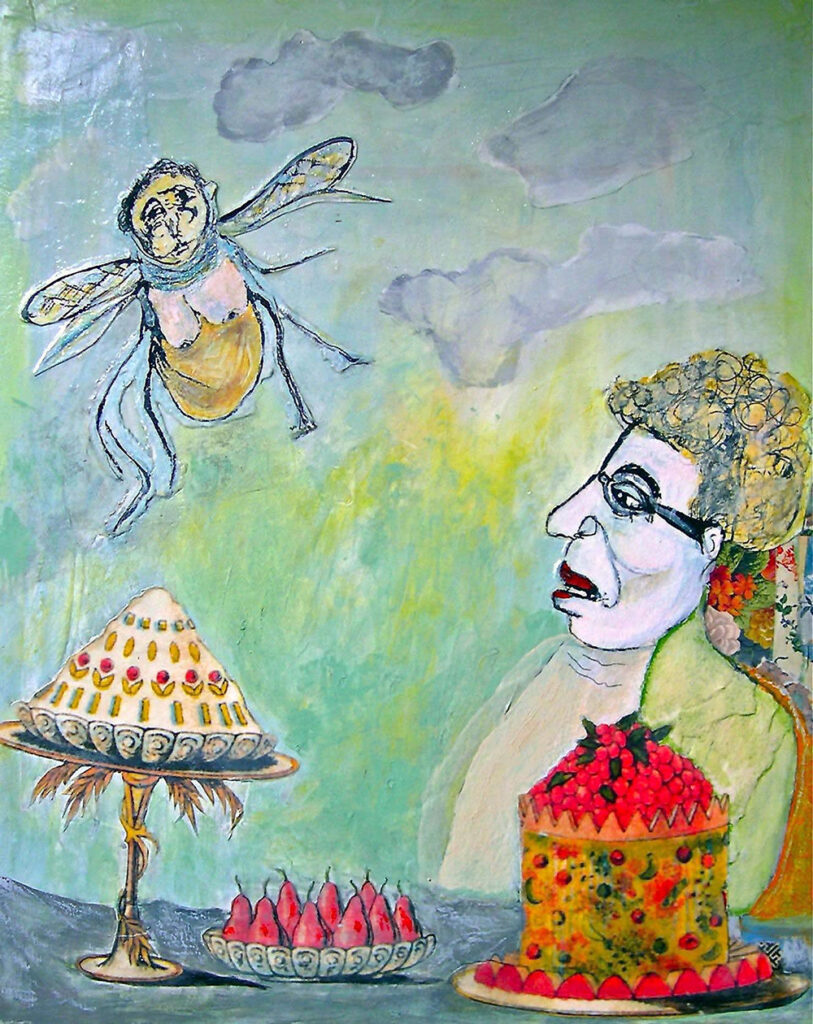By David Tromblay
Commodities are not a raw material or primary agricultural product that can be bought and sold, such as copper or coffee. Commodities are why you stand in line at the community center on the first Saturday of every month. There you receive blocks of pasteurized cheddar cheese product that comes in the same sort of flimsy cardboard box the government uses for clips of M16 ammunition. You’d think your seven-year-old self could tell the difference between MREs and commodities, with those gallon tubs of peanut butter, boxes of instant nonfat dry milk, egg mix, seedless raisins, corn flakes cereal—all of which comes in nondescript white waxy cardboard packaging lined with aluminum, or something silver-colored. But then there are the rusted cans of carrots and green beans, along with the ones featuring the silhouettes of the animal supposedly inside:
BEEF with juices.
PORK with juices.
One Whole Chicken with Broth without Giblets.
There is bag after bag of sugar and flour, too. But being handed sticks of butter or margarine tubs is not something there’s a memory of. Neither is ever being out of Crisco. If you’re lucky, the local grocery stores pitch in boxes of macaroni and cheese. Not Kraft Macaroni & Cheese, but the kind that doesn’t have a TV commercial. Sometimes there is a twenty-pound sack of potatoes or a five-pound bag of apples.
Sometimes they’ve already gone soft.
The bread always has to go straight into the freezer, so it won’t go bad. Let’s not forget the farina: the flavorless, generic knockoff Cream-of-Wheat. Thankfully, a big bowl of sugar is on the table to fix its flavorlessness. Grandma takes her coffee black—no sugar—so she doesn’t care how much you put on your cereal, so there is always a little white crystallized island rising from the sea of milk in your cereal bowl. When the farina and fake cornflakes run out, there is a bowl of rice with milk and cinnamon to get you through until school serves something for lunch. The rice gets hard to eat after it turns cold. It’s harder to eat once you see the kids you can help for just sixteen cents a day eating the same thing on the television set.
The Saturday after Halloween is when Grandma makes the first few batches of Christmas cookies. Thanks to her Betty Crocker cookbook looking like the collected works of Dickens, with dozens of dozens of recipes she’s scissored out of the newspaper sticking out of the pages, half serving as bookmarks, you never know what she’s going to make until it’s time to lick the beaters or roll out the dough when she says her hands hurt.
Saturday morning is always one of solitude. It’s when you wake to watch cartoons before the rest of the house stirs. Friday night is when Grandma Audrey and Grandpa Bub spend the evening at the Moose Lodge doing their damnedest to outdrink one another, but that’s after they go to the grocery store. It’s almost winter, so it’s too cold to take you and leave you in the parking lot with the dogs. But, because it’s almost winter, they can leave the food in the car and not worry about anything melting or defrosting in the back of the station wagon.
They put the bags where your feet go when you ride in the rear-facing seat. The metal floor keeps everything cold, and laying the rear-facing seat down flat turns it into a makeshift cooler. But not bringing you with means Grandpa Bub will have to haul all the bags alone. It also means you don’t know what they bought, so the joy of finding a box of Fruity Pebbles in the Tupperware cabinet the following day is nothing if not worthy of note.
It’s not the generic stuff that kind of looks like Fruity Pebbles, the stuff that goes stale halfway through the bag despite Grandma putting it into a Tupperware pitcher. It’s not that stuff you find, but Post Fruity Pebbles. Your favorite of all the cereals. Not the puffed rice cereal Grandma always gets, which is so bad the manufacturer doesn’t even bother naming it. Not the stuff with the consistency of week-old popcorn, but Fruity fucking Pebbles.
Opening the cabinet and seeing the box is akin to discovering El Dorado.
You pour a bowl and drizzle ice-cold milk over the top, forgoing the spoonfuls of sugar. It is, after all, wholesome, sweetened rice cereal—it says so on the box—so you savor every spoonful until every orange, red, yellow, purple, green, and berry-blue flake is gone.
The shitstorm that is the second grade fades away when the fruit-flavored tie-dyed milk splashes across the two thousand or so taste buds on your tongue. Chickadees sing songs for you from their perches on the crabapple tree in the backyard while you drink the last drop of milk.
It’s that good.
When Grandma comes downstairs, you spring to your feet, ignoring the cartoons, not even waiting for a commercial break, and wrap your arms around her, hugging her, thanking her, reminding her how Fruity Pebbles is your all-time favorite. Your words stop her from patting the top of your head and cause her to march over to the Tupperware cabinet, where she sees you did indeed help yourself to a heaping bowl of Fruity Pebbles. Except they weren’t for you, and now she can’t make her Christmas bars. But she still reaches for the rolling pin. Not the wooden one. The marble one. The one that has no other use than being ornamental until the very second she uses it to crack your sacrum.
The doctor calls it a sacrum; everyone else calls it your tailbone. And Grandma tells the doctor it wouldn’t have happened if you’d just slowed down and walked down the stairs rather than run.

David Tromblay is a Midwestern Gothic author who served fourteen years between the Army and the Navy before attending the Institute of American Indian Arts for his MFA in Creative Writing. He has published four novels and a memoir. He lives in eastern Oklahoma with his dogs, cats, goats, guineas, and quail. You can visit him at: https://www.davidtromblay.com/books

